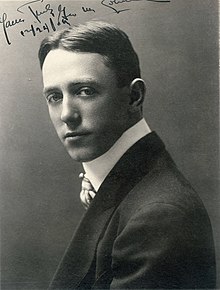George M. Cohan
George Michael Cohan (born July 3, 1878 in Providence , Rhode Island , † November 5, 1942 in New York City ) was an American actor, writer, composer, director and producer. A pioneer of musicals, he was jokingly known as "The Man Who Owns Broadway " in the decade leading up to World War I.
Life
Cohan's parents were Jeremiah Keohane "Jere" Cohan (1848-1917) and Helen Frances "Nellie" Costigan Cohan (1854-1928), Irish Catholics who made a living as traveling vaudeville artists. His sister Josephine "Josie" Cohan Niblo (1874–1916) later married the important film director Fred Niblo ; her son, Fred Niblo Jr. , became a screenwriter.
The siblings have performed on stage with their parents since early childhood. As a teenager, Cohan caused a sensation as a talented dancer. At the same time he began to write pieces and songs for the small family ensemble that performed under the name "The Four Cohans". In 1893 he sold his first songs to a publisher.
He had his first success on Broadway in 1904 with his show Little Johnny Jones . Cohan became one of the leading musical composers on Tin Pan Alley . He wrote and composed more than 1,500 songs known for their catchy melodies and funny lyrics. His best-known songs included Give My Regards to Broadway , You're a Grand Old Flag , The Warmest Baby In the Bunch , Life's a Funny Proposition After All , I Want to Hear a Yankee Doodle Tune , You Won't Do Any Business If You Haven't Got a Band , Mary's a Grand Old Name , The Small Town Gal , I'm Mighty Glad I'm Living, That's All , That Haunting Melody and Over There .
Together with Sam Harris, Cohan also worked as a producer and put on more than three dozen shows on Broadway from 1906 to 1926, including Louis Hirsch's and James Montgomery's hit show Going Up (1917).
In the 1930s, Cohan began a second career as a stage actor on Broadway. In 1932 he appeared alongside Claudette Colbert and Jimmy Durante in a double role in the musical The Phantom President . When he in Eugene O'Neill's play Ah, Wilderness! appeared, he first gained attention as a serious performer. In 1937 he was seen as President Franklin D. Roosevelt in the musical I'd Rather Be Right .
Cohan's musical Little Nellie Kelly (1922) reached a large audience in 1940 when Norman Taurog filmed the story with Judy Garland in the lead role. Cohan's crime play Seven Keys to Baldpate was filmed several times, most recently under the title The House of Long Shadows (1983, with Vincent Price ).
Michael Curtiz erected a cinematic monument to Cohan in 1942 with the biographical feature film Yankee Doodle Dandy . James Cagney , who played Cohan in this film, received an Oscar for his performance . Cohan's play The Meanest Man (1920) was also made into a film in 1943 .
At the age of 64, Cohan died of cancer. He is buried in Woodlawn Cemetery in the Bronx .
Cohan was married to the stage actress Ethel Levey (actually Grace Ethelia Fowler , 1880-1955), from whom he was divorced in 1907. In the same year he married the dancer Agnes Mary Nolan, who outlived him by 30 years. His second marriage daughters also went into show business.
effect
Cohan is considered to be the discoverer and supporter of many important figures in the American entertainment industry, such as B. Spencer Tracy .
literature
Autobiography:
- George M. Cohan: Twenty Years on Broadway and the Years It Took to Get There , 1925
Web links
- George M. Cohan in the Internet Movie Database (English)
- George M. Cohan in the Internet Broadway Database
- George M. Cohan In America's Theater
- George M. Cohan on musicals101.com
- tomb
- F. Gwynplaine MacIntyre, "Dancing after retirement: Cohan plays Roosevelt, 1937," New York Daily News , March 20, 2004. [1]
- List of Cohan's Broadway shows
| personal data | |
|---|---|
| SURNAME | Cohan, George M. |
| ALTERNATIVE NAMES | Cohan, George Michael (full name) |
| BRIEF DESCRIPTION | American musical writer and producer |
| DATE OF BIRTH | July 3, 1878 |
| PLACE OF BIRTH | Providence , Rhode Island , USA |
| DATE OF DEATH | November 5, 1942 |
| Place of death | New York City , New York State , USA |


